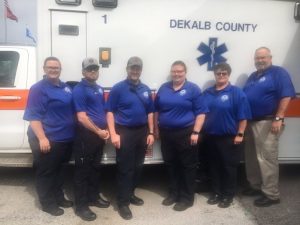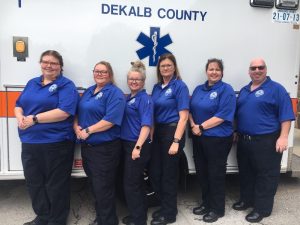News
County Mayor Signs Proclamation Recognizing EMS Week
May 20, 2021
By: Dwayne Page
A week dedicated to celebrating emergency service workers is being recognized in DeKalb County.
The community relies on emergency workers to rush to the rescue, no matter what the circumstance.
County Mayor Tim Stribling signed a proclamation Monday designating May 16-22 as Emergency Medical Services (EMS) Week in DeKalb County. EMS Director Hoyte Hale joined County Mayor Stribling for the occasion.
“We are proud of our DeKalb County EMS employees, EMTs, Paramedics, First Responders and Dispatchers. They are on the front lines, 24 hours a day, seven days a week, 365 days a year Their commitment, dedication and bravery speaks to their character and willingness to serve others, not just this week, but every day of the year. We are honored to celebrate their service this week, and we are grateful to them every day,” said Stribling.
The proclamation is as follows:
“Whereas, Emergency Medical Services is a vital public service; and
Whereas, the members of Emergency Medical Teams are ready to provide lifesaving care to those in need 24 hours a day, seven days a week; and
Whereas, access to quality Emergency Care dramatically improves the survival and recovery rate of those who experience sudden illness or injury; and
Whereas, the Emergency Medical Services system consists of emergency physicians, emergency nurses, emergency medical technicians, paramedics, firefighters, educators, administrators, and others; and
Whereas, the members of Emergency Medical Services teams, whether career or volunteer, engage in thousands of hours of specialized training and continuing education to enhance their lifesaving skills; and
Whereas, it is appropriate to recognize the value and the accomplishments of Emergency Medical Services providers by designating Emergency Medical Services Week;
Now, Therefore, I Tim Stribling, County Mayor, DeKalb County, Tennessee, in recognition of this event do hereby proclaim the week of May 16-22 as Emergency Medical Services Week.
With the theme, EMS Strong-This is EMS: Caring for our Communities, I encourage the community to observe this week with the appropriate programs, ceremonies, and activities”.
Members of the DeKalb EMS Staff in addition to Director Hoyte Hale (EMT-P) are:
Donna Melton-AEMT
Jamie Parsley-AEMT
Tony Williams-EMT-P
John T. Bradford-EMT-P
David Pitts-EMT-P
Kristie Johnson-EMTPCCICDA
Michelle Haggard-AEMT
Misty Green-AEMT
Trent Phipps-EMT-P
Daniel Summers-EMT-P
Racheal Checci- AEMT
Dennis Sherman- EMT-PCC
Matt Melton-EMT-P
Stephanie Brown-EMT-P
Matthew Adcock- AEMT
Trevin Merriman-AEMT
Jacob Dickerson-EMT-PCC
Cody Johnson-EMT-PCC
Charles Nokes-EMT-P
John Hurd-EMT-PCC
Becky Atnip-AEMT
Lonnie Laxton-AEMT
Rebecca Partridge-AEMT
Kevin Cripps-AEMT
Ed Brooks-AEMT
Houston Austin-EMT-PCC/IC
Marie Turpin-EMT-PCC
Kim Johnson-EMT-PCC
Tyler Grandstaff-EMT-PCC
John Poss-AEMT
Jason Rice-AEMT
Matthew Terrell-AEMT
John Partridge-AEMT
Greg Whaley-AEMT
Aspen Flarity-AEMT
Justin Thompson-AEMT
Greta Stone-EMT-PCC/IC
Terrence Hall- EMT-P
Clayton Anstis-EMT-PCC
Heather Billings-EMT-B
Tony McCulley-AEMT
Kenny Moffitt-EMT-PCC
Wesley Slager-AEMT
Eli Beadle-AEMT
Teena Allen-Office Manager
Kary Harris-Secretary
DCHS Tiger Soccer Team Seeks First Ever Region Tournament Championship
May 20, 2021
By: Dwayne Page
The Tiger baseball team is not the only DCHS athletic program bound for the sub-state.
The DCHS Tiger soccer team is enroute there too! But first, the Soccer Tigers will be playing tonight (Thursday) for the program’s first ever Region 3A tournament championship. The game will be played at Cumberland County stating at 6 p.m.
The Tigers defeated Loudon 2-0 on the road Tuesday, May 18 to claim the first ever region tournament semi-final soccer victory in school history.
In that game Cameron Miller scored in the 64th minute with an assist by Miguel Mata followed by a goal from Yair Mata in the 68th minute and an assist by Brian Balderas.
Goalie Luke Jenkins had 23 saves
The DCHS Tiger soccer team is 9-7 on the season. Cumberland County is 14-5-1
Smithville Man Arrested on South Carolina Fugitive Warrant
May 20, 2021
By: Dwayne Page
A 42 year old Smithville man was arrested last week on a fugitive from justice warrant out of South Carolina.
Richard Rae Conrad Jr. is under a $75,000 bond and he will make a court appearance on May 27.
Sheriff Patrick Ray said that on May 13 a detective went to Conrad’s home on Green Acre Drive to serve active warrants against him from Greenville, South Carolina for a 3rd degree offense of criminal sexual conduct with a minor, attempting to commit a lude act on a victim under 16 years of year by someone over 14 years old. Greenville authorities plan to seek extradition of Conrad back to South Carolina.
42 year old Amy Renee Ford of Watertown is charged with possession of methamphetamine with intent to manufacture, sell, or deliver. Her bond is $10,000 and she will make a court appearance on May 27.
Sheriff Ray said that on May 10 a deputy was summoned to the location of a 911 hang up call in the area of Dry Creek at the swimming hole. Upon arrival the officer found a man and woman, who appeared to be startled and nervous, sitting in a red Chevy truck. They admitted to having called 911.
A background check revealed that Ford had a warrant against her in Smith County. As the deputy placed Ford into custody, she handed him a bag of a green leafy substance, believed to be marijuana. The driver also informed the officer that there were needles and pipes used to smoke marijuana in the vehicle. During a search the deputy found a silver container with needles and 1.5 grams of a white crystal like substance believed to be methamphetamine. Ford admitted that the items found belonged to her
54 year old Joe Anthony Young of Lee Homer Road, Smithville, an inmate at the jail, was charged with using implements to escape and aggravated assault.
Sheriff Ray said that on May 11 a DeKalb correctional officer went to one of the holding cells to remove Young to finish the booking process but Young became noncompliant and darted toward the cell door trying to escape. As officers began to uncuff Young, he assaulted them grabbing a correctional officer’s arm and Taser. The officer then used the Taser on Young. He is under a total bond of $17,500.
38 year old Natasha Anne Sellars of Evins Mill Road is charged with resisting stop frisk halt or search and disorderly conduct. She is under a $1,000 bond.
Sheriff Ray said that on May 12 a deputy was called to Evins Mill Road where a woman was spotted walking in the roadway, yelling, and causing a disturbance. Upon arrival, the officer found Sellars there in the roadway still yelling and she refused to stop when ordered to do so. Sellars was placed into custody.
21 year old Robert Stephen Derrick of Toad Road, Dowelltown is charged with resisting stop frisk halt or search and failure to appear in court.
Sheriff Ray said that on May 15 a deputy was patrolling Floyd Drive when he spotted a man walking along the road. The officer stopped to conduct a welfare check and found the man to be Derrick. Knowing that Derrick had active warrants against him, the deputy summoned Derrick to the patrol car but he refused and then took off running. After a short distance Derrick was taken into custody. He is under a $4,500 bond and is due in court on June 3.
44 year old Christopher Keith Tyler of Hartsville is charged with domestic assault. He is under a $5,000 bond and his court date is June 3.
Sheriff Ray said that on May 16, a deputy was summoned to the area of Terrell Road and Sparta Highway due to a domestic complaint. Upon arrival the deputy spoke with the caller who reported that he had observed a man and woman engaged in an altercation. The complainant said the man dragged the woman into a wooded area.
The officer went to investigate and found the man and woman on the ground. She had lacerations on her face. The man was identified as Tyler and he was placed into custody.
« First ‹ Previous 1 1091 1181 1189 1190 11911192 1193 1201 1291 2564 Next › Last »




















